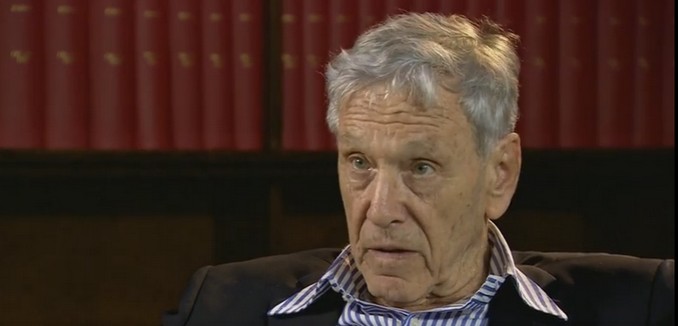One of Israel’s most prominent authors said on Tuesday that advocating against Israel’s very existence is where “anti-Zionism becomes anti-Semitism.”
“I can tell you exactly where I draw the line. If people call Israel nasty, I to some degree agree. If people call Israel the devil incarnated, I think they are obsessed – they are mad. But this is still legitimate,” Amos Oz, the 1988 winner of the Israel Prize, said in an interview with BBC’s Newsnight program. “But if they carry on saying that therefore there should be no Israel, that’s where anti-Zionism becomes anti-Semitism, because none of them ever said after Hitler that Germany should cease to exist, or after Stalin that there should be no Russia.”
“Saying that Israel should cease to exist, or should not have come into being, this is crossing the line,” he added.
Oz, who is known for his liberal views and has had his books published in over 40 languages, also expressed his opposition to cultural boycotts of Israel in the interview. “I think [the] boycott is hurting the wrong people,” he said. “The idea that all Israelis are villains is a childish idea. Israel is the most deeply divided, argumentative society. You’ll never find two Israelis that agree with one another – it’s hard to find even one who agrees with himself or herself.” He added that the boycott would just “harden the Israeli resistance.”
Oz’s comments were prompted in part by a February 2015 letter signed by some 100 British artists pledging to boycott Israel. In response, 150 other British artists and authors, including Hilary Mantel and J. K. Rowling, signed a letter condemning efforts to culturally isolate Israel. “Cultural boycotts singling out Israel are divisive and discriminatory and will not further peace,” they wrote.
Yossi Klein Halevi, an award-winning Israeli author, wrote in June that proponents of the Palestinian-led Boycott, Divestment, and Sanctions (BDS) campaign have a “vision of a world without Israel,” and “would press on until Israel was erased from the map,” even if Israel made every single concession demanded by the Palestinians.
Klein Halevi pointed out that BDS “negates the very idea of a nation-state for the Jewish people,” and “takes one of the world’s most complex and heartbreaking conflicts — between two traumatized peoples — and turns it into a morality play between darkness and light. The movement to criminalize Israel is itself a crime.”
Booker Award-winning British novelist Howard Jacobson also discussed in April the issue of disguising anti-Semitic views, including calls for eliminating Israel, as mere criticism of Israel. “I think that being critical of Zionism and critical of Israel are not quite the same thing. I think anyone should think twice about being critical of Zionism, if I’m right, and I am right. It was and remains a liberation movement.”
“Be critical of Israel all you like,” he added. But “what I hear often, when the Left talks about Israel, is not what I call criticism. It’s a denunciation, it’s a vilification.”
Many top proponents of the Palestinian-led boycott campaign against Israel have publicly affirmed that they seek to undermine Israel’s existence. BDS co-founder Omar Barghouti, who opposes the two-state solution, said in 2014 that Palestinians have a right to “resistance by any means, including armed resistance,” while leading BDS activist As’ad Abu Khalil acknowledged two years prior that “The real aim of BDS is to bring down the state of Israel.”
[Photo: BBC Newsnight / YouTube ]




